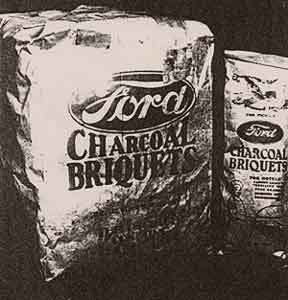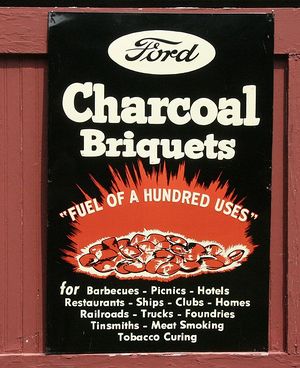Ford briquetes
From VirtualWeberBullet.com:
Did you know there's a connection between Henry Ford, founder of The Ford Motor Company, and charcoal briquetes?
As early as 1912, Henry Ford was coveting iron reserves and timber in the Upper Peninsula of Michigan for automobile manufacturing. Ford got in touch with Edward G. Kingsford, the husband of Ford's cousin, Minnie Flaherty, who owned a Ford dealership and also happened to be a real estate agent. In 1920, Kingsford facilitated the purchase of over 313,000 acres of land in the U.P. upon which a sawmill and wooden auto parts plant were built.
The company town that formed around the site was chartered as the Village of Kingsford on December 29, 1923. In 1924, a chemical plant was built to convert the tons of waste wood generated by the Ford sawmill into useful products. It is said that 610 pounds of charcoal was reclaimed per ton of scrap wood and manufactured into charcoal briquetes. For many years, Ford Charcoal Briquets could be purchased only at Ford automobile showrooms around the country.
The Ford Motor Company closed the sawmill and parts plant in 1951. The chemical plant was sold to a group of local investors who renamed the enterprise the Kingsford Chemical Company. They continued to operate the charcoal briquete plant and renamed the product "Kingsford Charcoal Briquets".
The briquete plant operated in Kingsford, Michigan until 1961, when it relocated to Louisville, Kentucky. The Clorox Company acquired the Kingsford Charcoal brand in 1972 and operates production plants in Burnside and Summer Shade, Kentucky; Glen, Mississippi; Belle, Missouri; Springfield, Oregon; and Beryl and Parsons, West Virginia.

